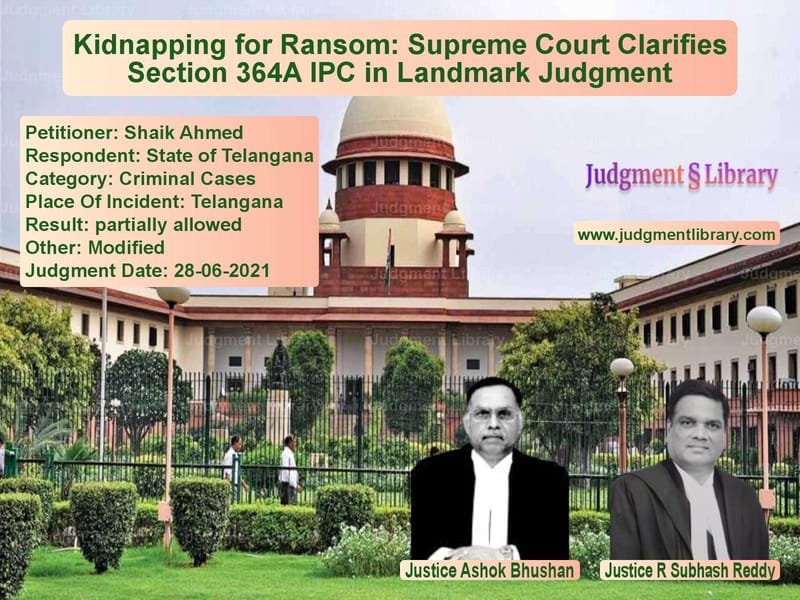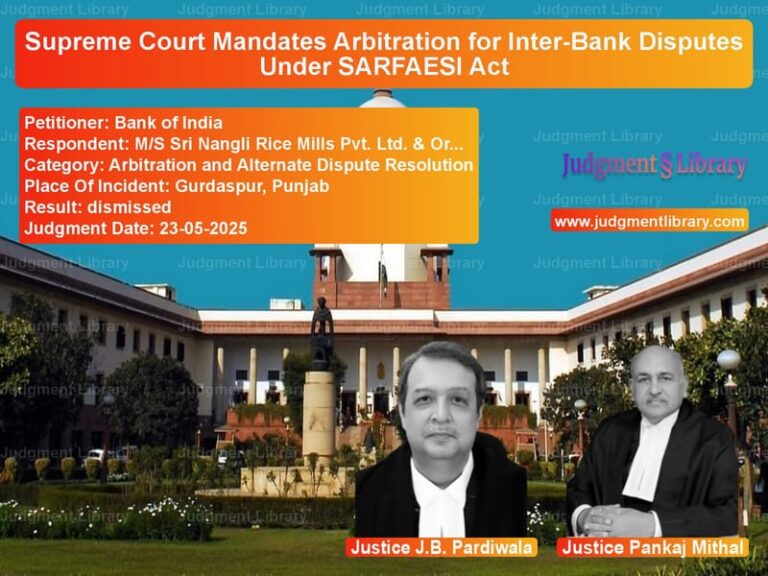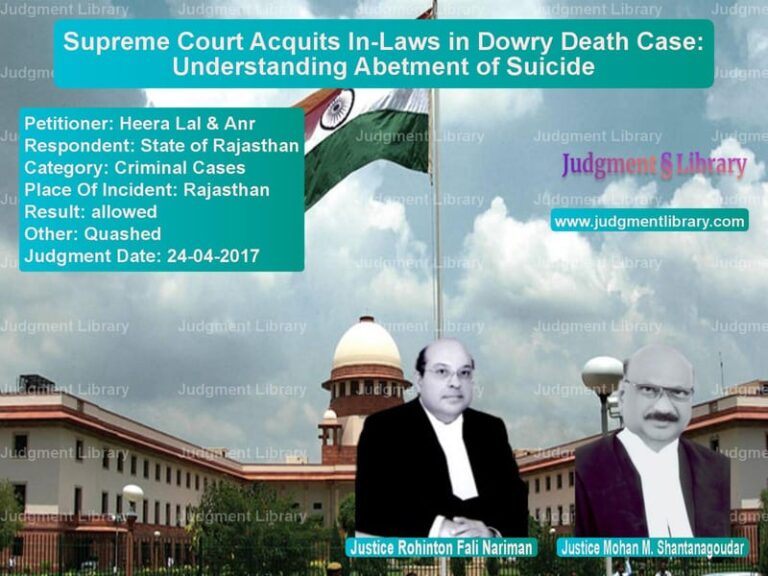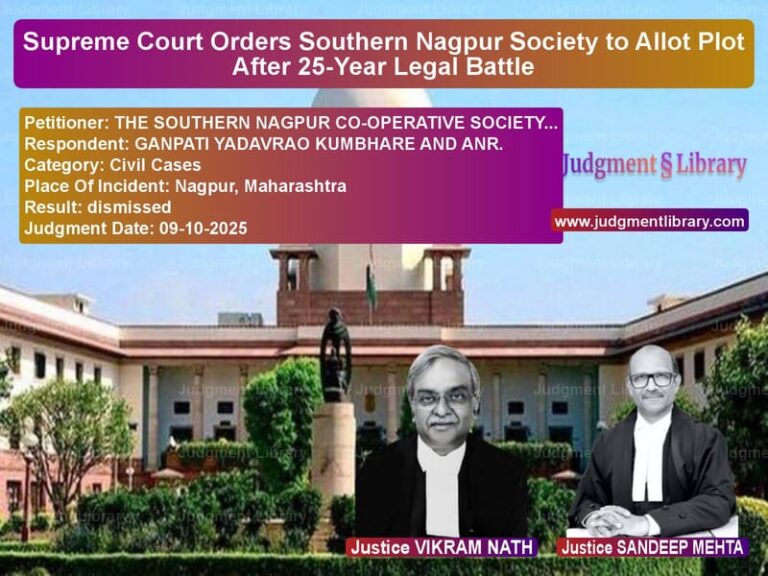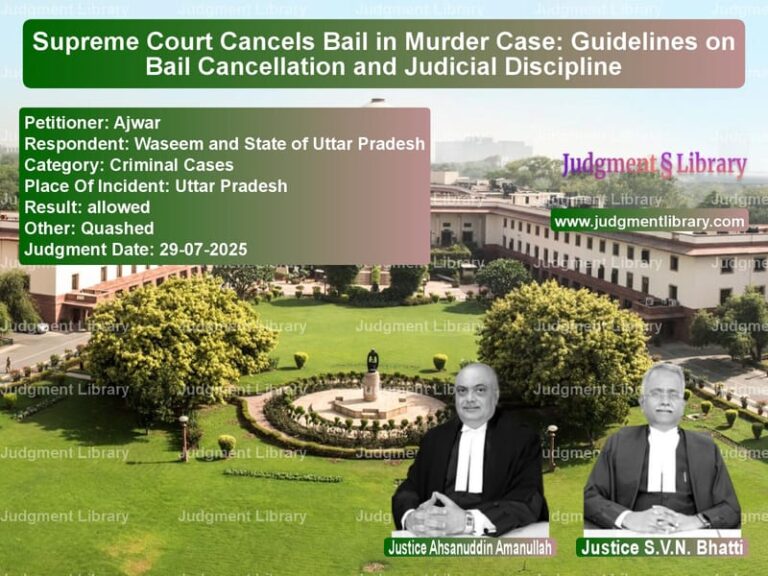Kidnapping for Ransom: Supreme Court Clarifies Section 364A IPC in Landmark Judgment
The case of Shaik Ahmed v. State of Telangana raised a significant legal question regarding the interpretation and application of Section 364A of the Indian Penal Code (IPC). The appellant was convicted under Section 364A for kidnapping a minor child and demanding ransom. However, the Supreme Court examined whether all the essential ingredients of Section 364A were fulfilled, ultimately modifying the conviction. This judgment is crucial in understanding the legal requirements for a conviction under this stringent law.
Background of the Case
The case originated from an incident on February 3, 2011, when the victim, a student of St. Mary’s High School, Secunderabad, missed his regular auto ride home and had to take another auto. The accused, Shaik Ahmed, drove the auto and instead of taking the victim home, he diverted the route, falsely claiming it was a shortcut. He took the child to his sister’s house and demanded a ransom of Rs. 2 lakhs from the victim’s father.
Following police intervention, the accused was caught while attempting to collect the ransom. The victim was rescued safely, and a case was registered under Section 364A IPC, leading to the accused’s conviction for life imprisonment by the Sessions Court, which was later upheld by the Telangana High Court.
Read also: https://judgmentlibrary.com/supreme-court-upholds-conviction-in-dowry-death-case-legal-analysis/
Arguments Presented Before the Supreme Court
Arguments by the Appellant
The counsel for the appellant challenged the conviction on the following grounds:
- The prosecution failed to prove all the essential ingredients required for a conviction under Section 364A IPC.
- The accused never threatened the victim with death or bodily harm, nor did his conduct give rise to a reasonable apprehension of death or hurt.
- The victim, in his statement, mentioned that he was treated well and not harmed in any way.
- Both the Sessions Court and the High Court failed to analyze whether all the necessary elements of Section 364A were satisfied.
Arguments by the Respondent (State of Telangana)
The prosecution, represented by Ms. Bina Madhavan, argued that:
- The appellant had kidnapped the victim and demanded ransom, which was sufficient to attract Section 364A.
- The evidence of the victim and his father clearly established the chain of events.
- Section 364A does not necessarily require physical harm; the demand for ransom itself is sufficient to establish intent.
- The High Court correctly upheld the conviction based on the evidence presented.
Supreme Court’s Legal Analysis
The Supreme Court, consisting of a bench of Ashok Bhushan and R. Subhash Reddy, analyzed the case in depth and posed the following key questions:
- What are the essential ingredients of Section 364A IPC?
- Do all elements of Section 364A need to be established beyond a reasonable doubt?
- Did the Sessions Court and High Court correctly interpret the law while convicting the appellant?
- Was there sufficient evidence that the accused threatened to cause death or hurt to the victim?
Essential Ingredients of Section 364A IPC
The Court referred to various precedents and highlighted that Section 364A contains three essential conditions:
- The accused must have kidnapped or abducted a person or kept a person in detention after such kidnapping or abduction.
- The accused must have threatened to cause death or hurt to the victim, or by conduct, given rise to a reasonable apprehension that such harm may occur.
- The act must have been committed to compel the Government, a foreign State, an international organization, or any other person to do or abstain from doing any act or to pay a ransom.
The Court emphasized that fulfilling the first condition alone is insufficient. The presence of the second or third condition is mandatory for a conviction under Section 364A.
Findings of the Supreme Court
The Supreme Court examined the testimonies of the victim and his father and found that:
- The victim was not physically harmed or threatened with death.
- The victim himself stated that he was treated well.
- The father of the victim never claimed that the accused threatened to harm his son.
- The Sessions Court and High Court failed to record any specific findings on whether a threat of death or harm was made.
Based on these findings, the Court concluded that the second essential condition of Section 364A was not met. As a result, the conviction under this section could not be sustained.
Modification of Conviction
Although the Supreme Court set aside the conviction under Section 364A, it recognized that the accused had kidnapped the victim and demanded ransom, which still constituted an offense under Section 363 IPC (Kidnapping). The Court sentenced the appellant to seven years of imprisonment under Section 363 IPC and imposed a fine of Rs. 5,000.
Impact of the Judgment
This judgment is significant because:
- It clarifies that merely demanding ransom after kidnapping is not enough for a conviction under Section 364A.
- There must be an actual threat to life or physical harm or a reasonable apprehension of such harm.
- The judiciary must ensure that all essential ingredients of a criminal provision are strictly fulfilled before convicting an accused.
- The case sets a precedent for future kidnapping-for-ransom cases, ensuring fair legal interpretation.
Conclusion
The Supreme Court’s decision in Shaik Ahmed v. State of Telangana underscores the necessity of a meticulous legal approach when dealing with serious offenses like kidnapping for ransom. The ruling ensures that courts do not convict individuals under stringent laws without fulfilling all necessary legal criteria. By modifying the conviction to Section 363 IPC, the Court balanced the principle of legality while still ensuring justice for the victim.
The appeal was partially allowed, with the conviction under Section 364A set aside and the appellant sentenced under Section 363 IPC instead.
Petitioner Name: Shaik Ahmed.Respondent Name: State of Telangana.Judgment By: Justice Ashok Bhushan, Justice R Subhash Reddy.Place Of Incident: Telangana.Judgment Date: 28-06-2021.
Don’t miss out on the full details! Download the complete judgment in PDF format below and gain valuable insights instantly!
Download Judgment: shaik-ahmed-vs-state-of-telangana-supreme-court-of-india-judgment-dated-28-06-2021.pdf
Directly Download Judgment: Directly download this Judgment
See all petitions in Bail and Anticipatory Bail
See all petitions in Judgment by Ashok Bhushan
See all petitions in Judgment by R. Subhash Reddy
See all petitions in partially allowed
See all petitions in Modified
See all petitions in supreme court of India judgments June 2021
See all petitions in 2021 judgments
See all posts in Criminal Cases Category
See all allowed petitions in Criminal Cases Category
See all Dismissed petitions in Criminal Cases Category
See all partially allowed petitions in Criminal Cases Category

